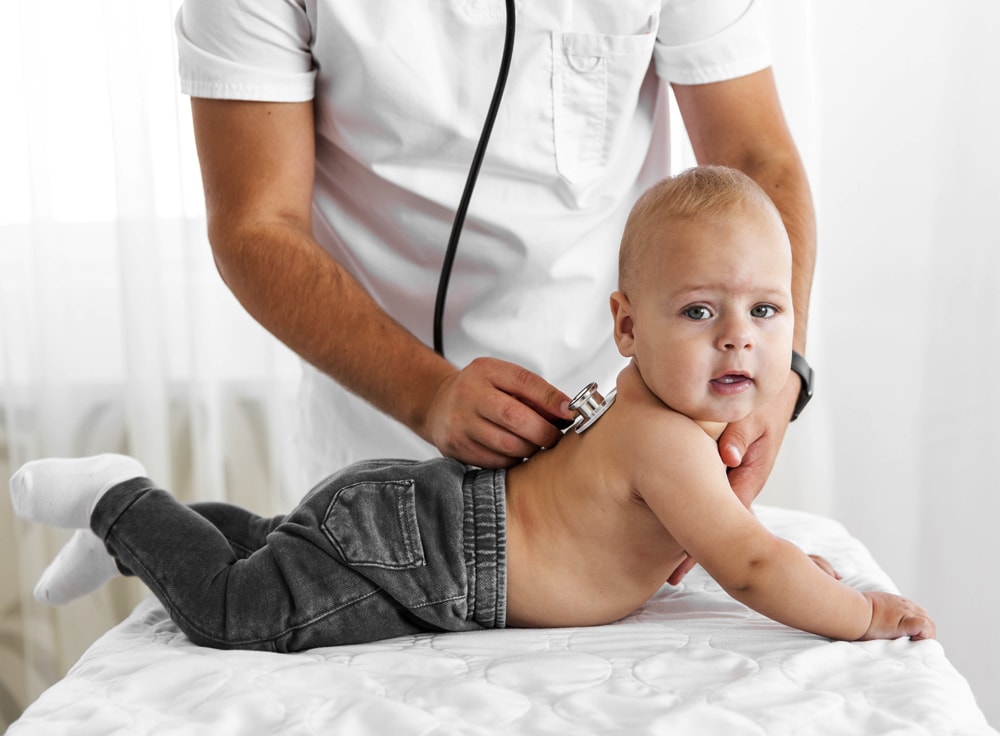
For first-time parents out there, knowing a baby’s checkup schedule can feel quite daunting. Even the healthiest of babies go to the pediatrician a lot. But why is this? The reason is that babies have unique health care needs compared to teenagers and adults. The first two years of a baby’s life is crucial for their growth and development. During this stage, you want to monitor your baby’s progress to keep their health in check. This article will cover everything you need to know about a baby’s checkup schedule 1 month after birth and right until they’re 24 months old.

1st month
During the first month of checkup, the pediatrician will perform a series of examinations like evaluating the baby’s development, taking measurements, and conducting a behavioural/psychosocial assessment. The pediatrician may test your baby for tuberculosis which is a common infection among newborns. Most babies receive their first shot of hepatitis B right after birth and it’s during the first month where your baby will receive their second hepatitis B shot.
2nd month
The second visit follows the same basic examinations conducted during the first month. Only this time, your baby will get more shots than usual. Diarrhoeal disease is a fairly common disorder among infants which is caused by the rotavirus. For this reason, your child will receive a rotavirus shot to prevent infection. Diphtheria vaccine is also given to the baby to guard them against diphtheria, a bacterial infection that can cause heart failure, breathing issues, and paralysis amongst infants.
4th month
Four months after birth is where your baby’s development starts to increase rapidly. The pediatrician will see noticeable changes in your child’s measurements as well as their behavioural/psychosocial conditions. Expect the baby to undergo hematocrit or hemoglobin screening to find out if your child has anemia, a condition that causes pallor and weakness in babies. The baby will also receive their second rotavirus and diphtheria shots.
6th month
It’s halfway to your baby’s first birthday and aside from the usual physical exams, the pediatrician will give your child their third shot of diphtheria vaccine and their final shot of hepatitis B vaccine. If this checkup schedule falls right in between flu season, the pediatrician may also consider giving your child a flu shot. A lead screening test is also done to ensure your child hasn’t been exposed to high levels of lead, which can affect the baby’s behavioural and developmental growth.
9th month
At this stage of the checkup, you’ll start to notice that your child has grown their first set of teeth. The usual examinations are as follows, only this time a developmental screening is performed. The pediatrician will ask you relevant questions about your child’s development to determine their overall behavioural condition. They may also ask you to play with your baby to determine if the child is learning basic skills at a normal pace. Oral health examinations are also conducted to evaluate your child’s oral condition.
12th month
Your child is now one year old and like with any other normal visit, the pediatrician will conduct a physical examination and a behavioural/psychosocial assessment. The baby will receive a new set of vaccinations for mumps, measles, and rubella as these infections are quite common in babies who reach one year of age. A lead screening and tuberculosis test are also done to check your child’s lead exposure and susceptibility to tuberculosis.
15th month
During this checkup schedule, the pediatrician will follow the same procedures along with previous checkups. Your baby will also receive their first shots of Hib vaccine, PCV, MMR, and IPV along with their fourth shot of diphtheria vaccine. As your child approaches their 2nd birthday, the pediatrician will perform more comprehensive examinations to see if their development is in the right track.
18th month
After conducting a routine physical examination, the pediatrician will check your baby for signs of autism spectrum disorders (ASDs). They will observe how the child responds to certain situations and ask you about your child’s behavioural progress. If your child exhibits signs of ASD, the pediatrician will recommend programs or services that will help with the child’s development.
24th month
At this point, your child has undergone massive changes t in their physical and psychological condition. The baby will undergo developmental surveillance, behavioural/psychosocial assessment, and a physical examination. Also, expect your child to receive an MCV4 vaccine and hematocrit or hemoglobin screening. A tuberculosis test followed by an oral health examination completes your child’s checkup.
As you may have noticed, there aren’t that many changes in a baby’s checkup schedule from when they were 1 month old up to their 24th month. The most important thing is to not miss any checkups as the infant will require all the immunization they need to protect themselves against viruses, bacteria, and infections. Understanding your child’s checkup routine is crucial to their growth as you want to provide them with the best care possible. Always follow through with your child’s checkup schedule to ensure their overall development is heading in the right direction and speak to your local paediatrician as frequently as required to navigate through these times.
